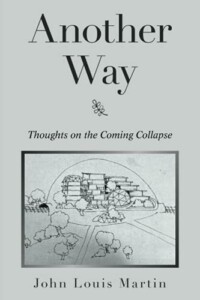Title: Another Way: Thoughts on the Coming Collapse
Author: John Louis Martin
Publisher: XlibrisUS
ISBN: 978-1543498882
Pages: 114
Genre: Self-Help
Reviewed by: Barbara Bamberger Scott
Pacific Book Review
With a professional background in factory work and logistics, and a special interest in futurism and its implications, author John Louis Martin has constructed a disturbingly rational look at what is happening in the world now, and what may be to come.
Martin believes that with overpopulation, waste of valuable resources, and a general lack of understanding of the direction we may be heading, Americans need to stop, look, and listen – now. Neither electric cars, nor ethanol made from corn, nor windmills planted in tons of concrete are going to solve the problems we face. While people rush to suburbs and the cities where they are paid more to do less to solve our problems, “there are thousands of main streets across America with empty storefronts.” He advocates a return to genuine rural life, which would include such radical changes as improving and utilizing more railroads and eliminating auto use, getting water from wells, encouraging couples to have only one child, and growing sustainable foods for ourselves. Those who do the hardest, dirtiest work may be the ones whose efforts will become the most valued. Yet this simple life – radiating around towns with their own
medical facilities and locally produced goods and indigenous services – would not lack creative possibilities for change, such as new approaches to solar heating, and a greater, scientifically examined understanding of what “simple living” and “alternative technologies” truly entail.
In preparing this fascinating look at what is and what might be, Martin acknowledges that we must pass through a state of grief as we adopt the new, which is in many significant ways, a return to the old but with deeper intent. Martin takes an unusually independent view of American life, a view that is not apparently bound to any political loyalties, yet which encompasses ideas from those on both major sides of that spectrum. He gives excellent examples, such as the improvement in health that resulted in Britain during World War II, when no white flour was available, so people ate a brown bread product developed by the government. Martin quotes from a multitude of respected sources in these realms of thought: E. F. Schumacher, Buckminster Fuller, Aldous Huxley, Lao Tzu, Rachel Carson, and R. D. Laing to name only a few. He recalls his own work experience in a factory where the more directives he issued, the less work was accomplished, until all directives were dropped and, unburdened by so many specific protocols, workers were able to meet the necessary deadlines and quotas.
It is this sort of change (and he notes that all changes cause change) that the author espouses. Martin demonstrates here the potential to become a new spokesperson for a future with fewer orders, fewer borders, greater simplicity and far more genuine resource security.


